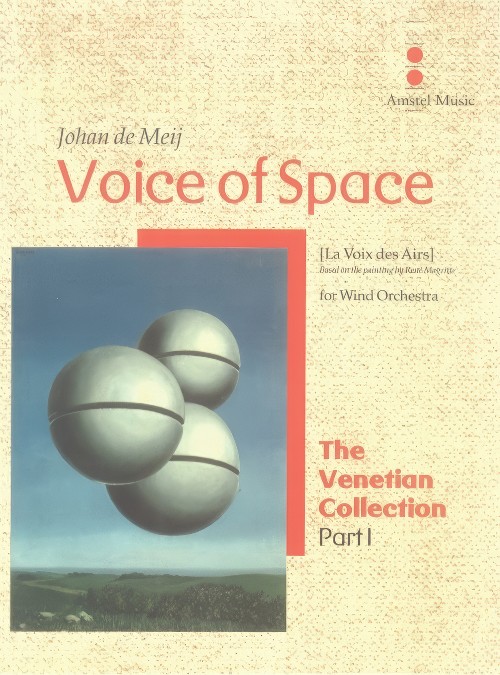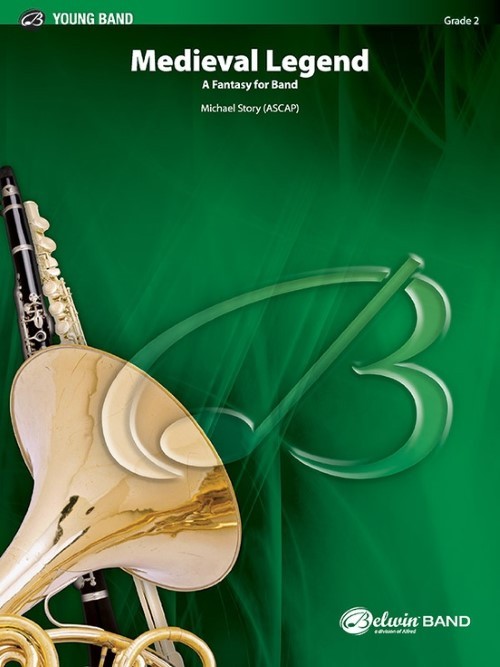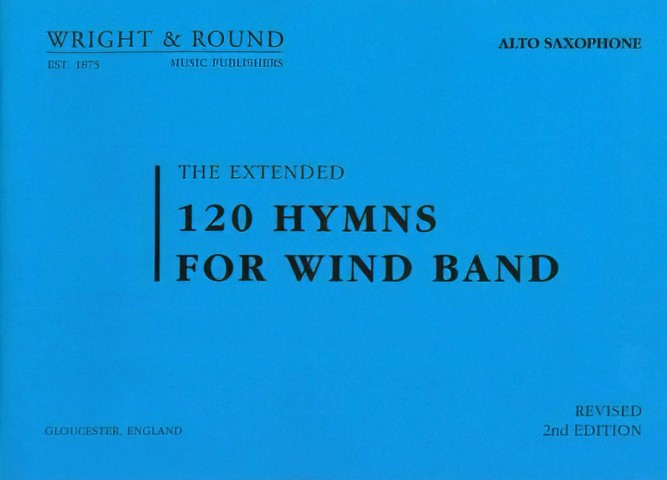Results
-
 £148.00
£148.00Voice of Space (from The Venetian Collection) (Concert Band - Score and Parts) - De Meij, Johan
Voice of Space is the first movement of The Venetian Collection. The picture on which the music is based on was painted by the Belgian surrealist artist Rene Magritte. Along with Ensor, Permeke and Delvaux he was one of the most important painters of the 20th century. Duration: 8.15
Estimated dispatch 7-14 working days
-
 £55.50
£55.50Medieval Legend (A Fantasy for Band) (Concert Band - Score and Parts) - Story, Michael
A striking tutti fanfare builds to a fugue-like section initiated by the woodwinds and draws to a dynamic musical conclusion. Outstanding teaching opportunities abound in this driving and dynamic composition. You won't want to miss this Michael Story original which he has subtitled A Fantasy for Band. Duration: 3.30
Estimated dispatch 7-14 working days
-
 £7.50
£7.50120 Hymns for Wind Band (1st Clarinet) - Steadman-Allen, Ray
Contents 1. Aberystwyth31. Geibel 61. National Anthem 91. St. Michael121. Angels from the Realms of Glory2. Abridge32. Gerontius62. Nearer, My God, To Thee92. St. Oswald122. As with Gladness3. Angelus33. Gopsal63. Nicaea93. St. Peter123. Christians Awake4. Aurelia34. Hanover64. Notingham (Mozart)94. St. Theodulph124. The Coventry Carol;5. Austrian Hymn35. Hollingside65. Nun Danket95. St. Theresa125. Ding Dong Merrily on High6. Belmont36. Horsley66. Old Hundredth96. Samuel126. Deck the Halls7. Blaenwern37. Hursley67. Passion Chorale97. Sandon127. God Rest ye Merry Gentlemen8. Carlisle38. Hyfrydol68. Penlan98. Sawston128. Good King Wenceslas9. Christ the King39. Innocents69. Pentecost99. Sine Nomine129. Good Christian Men Rejoice10. Colne40. Kocher70. Pilgrims100. Stella130. The Holly and The Ivy11. Cor Jesu41. Laudate Dominum71. Praise my Soul101. Stracathro131. I Saw Three Ships12. Corpus Christi42. Laudes Domini72. Redhead102. Stuttgart132. It Came upon the Midnight Clear13. Crimond43. Lloyd73. Regent Square103. Tallis' Canon133. Jingle Bells14. Cross of Jesus44. Lobe den Herren74. Richmond104. Turris Davidica134. O Little Town of Bethlehem15. Darwalls 148th45. Love Divine75. Rimmington105. Victory135. The Rocking Carol16. Day of Rest46. Lux Benigna76. Rockingham106. Vox Dilecti136. See Amid the Winter Snow17. Dennis47. Maidstone77. St. Agnes107. Wareham137. Unto us a Child is Born18. Diadem48. Mannheim78. St. Albinus108. Warrington138. Wassail19. Diademata49. Martyrdom79. St. Ann109. Westminster139. We Three Kings20. Divine Mysteries50. Maryton80. St. Bees110. When He Cometh140. We Wish you a Merry Christmas21. Dix51. Melcombe81. St. Cecilia111. Whitburn 22. Dominus Regit Me52. Melita82. St. Clement112. Wiltshire 23. Duke Street53. Miles Lane83. St. Columba113. Wir pflugen (Dresden) 24.Dundee (French)54. Misericordia84. St. Cuthbert114. O Come All Ye Faithful 25. Easter Hymn55. Missionary85. St. Denio115. Away in a Manger 26. Ein' Feste Burg56. Monkland86. St. Ethelwald116. Hark! The Herald Angels Sing 27. Ellacombe57. Monks Gate87. St. Francis117. Once in Royal David's City 28. Ellers58. Morning Hymn88. St. George118. Nowell 29. Eventide59. Morning Light89. St. Gertrude119. Silent Night 30. Franconia60. Moscow90. St. Magnus120. While Shepherds Watched
Estimated dispatch 7-14 working days
-
 £7.50
£7.50120 Hymns for Wind Band (1st F Horn) - Steadman-Allen, Ray
Contents 1. Aberystwyth31. Geibel 61. National Anthem 91. St. Michael121. Angels from the Realms of Glory2. Abridge32. Gerontius62. Nearer, My God, To Thee92. St. Oswald122. As with Gladness3. Angelus33. Gopsal63. Nicaea93. St. Peter123. Christians Awake4. Aurelia34. Hanover64. Notingham (Mozart)94. St. Theodulph124. The Coventry Carol;5. Austrian Hymn35. Hollingside65. Nun Danket95. St. Theresa125. Ding Dong Merrily on High6. Belmont36. Horsley66. Old Hundredth96. Samuel126. Deck the Halls7. Blaenwern37. Hursley67. Passion Chorale97. Sandon127. God Rest ye Merry Gentlemen8. Carlisle38. Hyfrydol68. Penlan98. Sawston128. Good King Wenceslas9. Christ the King39. Innocents69. Pentecost99. Sine Nomine129. Good Christian Men Rejoice10. Colne40. Kocher70. Pilgrims100. Stella130. The Holly and The Ivy11. Cor Jesu41. Laudate Dominum71. Praise my Soul101. Stracathro131. I Saw Three Ships12. Corpus Christi42. Laudes Domini72. Redhead102. Stuttgart132. It Came upon the Midnight Clear13. Crimond43. Lloyd73. Regent Square103. Tallis' Canon133. Jingle Bells14. Cross of Jesus44. Lobe den Herren74. Richmond104. Turris Davidica134. O Little Town of Bethlehem15. Darwalls 148th45. Love Divine75. Rimmington105. Victory135. The Rocking Carol16. Day of Rest46. Lux Benigna76. Rockingham106. Vox Dilecti136. See Amid the Winter Snow17. Dennis47. Maidstone77. St. Agnes107. Wareham137. Unto us a Child is Born18. Diadem48. Mannheim78. St. Albinus108. Warrington138. Wassail19. Diademata49. Martyrdom79. St. Ann109. Westminster139. We Three Kings20. Divine Mysteries50. Maryton80. St. Bees110. When He Cometh140. We Wish you a Merry Christmas21. Dix51. Melcombe81. St. Cecilia111. Whitburn 22. Dominus Regit Me52. Melita82. St. Clement112. Wiltshire 23. Duke Street53. Miles Lane83. St. Columba113. Wir pflugen (Dresden) 24.Dundee (French)54. Misericordia84. St. Cuthbert114. O Come All Ye Faithful 25. Easter Hymn55. Missionary85. St. Denio115. Away in a Manger 26. Ein' Feste Burg56. Monkland86. St. Ethelwald116. Hark! The Herald Angels Sing 27. Ellacombe57. Monks Gate87. St. Francis117. Once in Royal David's City 28. Ellers58. Morning Hymn88. St. George118. Nowell 29. Eventide59. Morning Light89. St. Gertrude119. Silent Night 30. Franconia60. Moscow90. St. Magnus120. While Shepherds Watched
Estimated dispatch 7-14 working days
-
 £7.50
£7.50120 Hymns for Wind Band (1st Trombone BC) - Steadman-Allen, Ray
Contents 1. Aberystwyth31. Geibel 61. National Anthem 91. St. Michael121. Angels from the Realms of Glory2. Abridge32. Gerontius62. Nearer, My God, To Thee92. St. Oswald122. As with Gladness3. Angelus33. Gopsal63. Nicaea93. St. Peter123. Christians Awake4. Aurelia34. Hanover64. Notingham (Mozart)94. St. Theodulph124. The Coventry Carol;5. Austrian Hymn35. Hollingside65. Nun Danket95. St. Theresa125. Ding Dong Merrily on High6. Belmont36. Horsley66. Old Hundredth96. Samuel126. Deck the Halls7. Blaenwern37. Hursley67. Passion Chorale97. Sandon127. God Rest ye Merry Gentlemen8. Carlisle38. Hyfrydol68. Penlan98. Sawston128. Good King Wenceslas9. Christ the King39. Innocents69. Pentecost99. Sine Nomine129. Good Christian Men Rejoice10. Colne40. Kocher70. Pilgrims100. Stella130. The Holly and The Ivy11. Cor Jesu41. Laudate Dominum71. Praise my Soul101. Stracathro131. I Saw Three Ships12. Corpus Christi42. Laudes Domini72. Redhead102. Stuttgart132. It Came upon the Midnight Clear13. Crimond43. Lloyd73. Regent Square103. Tallis' Canon133. Jingle Bells14. Cross of Jesus44. Lobe den Herren74. Richmond104. Turris Davidica134. O Little Town of Bethlehem15. Darwalls 148th45. Love Divine75. Rimmington105. Victory135. The Rocking Carol16. Day of Rest46. Lux Benigna76. Rockingham106. Vox Dilecti136. See Amid the Winter Snow17. Dennis47. Maidstone77. St. Agnes107. Wareham137. Unto us a Child is Born18. Diadem48. Mannheim78. St. Albinus108. Warrington138. Wassail19. Diademata49. Martyrdom79. St. Ann109. Westminster139. We Three Kings20. Divine Mysteries50. Maryton80. St. Bees110. When He Cometh140. We Wish you a Merry Christmas21. Dix51. Melcombe81. St. Cecilia111. Whitburn 22. Dominus Regit Me52. Melita82. St. Clement112. Wiltshire 23. Duke Street53. Miles Lane83. St. Columba113. Wir pflugen (Dresden) 24.Dundee (French)54. Misericordia84. St. Cuthbert114. O Come All Ye Faithful 25. Easter Hymn55. Missionary85. St. Denio115. Away in a Manger 26. Ein' Feste Burg56. Monkland86. St. Ethelwald116. Hark! The Herald Angels Sing 27. Ellacombe57. Monks Gate87. St. Francis117. Once in Royal David's City 28. Ellers58. Morning Hymn88. St. George118. Nowell 29. Eventide59. Morning Light89. St. Gertrude119. Silent Night 30. Franconia60. Moscow90. St. Magnus120. While Shepherds Watched
Estimated dispatch 7-14 working days
-
 £7.50
£7.50120 Hymns for Wind Band (1st Trumpet) - Steadman-Allen, Ray
Contents 1. Aberystwyth31. Geibel 61. National Anthem 91. St. Michael121. Angels from the Realms of Glory2. Abridge32. Gerontius62. Nearer, My God, To Thee92. St. Oswald122. As with Gladness3. Angelus33. Gopsal63. Nicaea93. St. Peter123. Christians Awake4. Aurelia34. Hanover64. Notingham (Mozart)94. St. Theodulph124. The Coventry Carol;5. Austrian Hymn35. Hollingside65. Nun Danket95. St. Theresa125. Ding Dong Merrily on High6. Belmont36. Horsley66. Old Hundredth96. Samuel126. Deck the Halls7. Blaenwern37. Hursley67. Passion Chorale97. Sandon127. God Rest ye Merry Gentlemen8. Carlisle38. Hyfrydol68. Penlan98. Sawston128. Good King Wenceslas9. Christ the King39. Innocents69. Pentecost99. Sine Nomine129. Good Christian Men Rejoice10. Colne40. Kocher70. Pilgrims100. Stella130. The Holly and The Ivy11. Cor Jesu41. Laudate Dominum71. Praise my Soul101. Stracathro131. I Saw Three Ships12. Corpus Christi42. Laudes Domini72. Redhead102. Stuttgart132. It Came upon the Midnight Clear13. Crimond43. Lloyd73. Regent Square103. Tallis' Canon133. Jingle Bells14. Cross of Jesus44. Lobe den Herren74. Richmond104. Turris Davidica134. O Little Town of Bethlehem15. Darwalls 148th45. Love Divine75. Rimmington105. Victory135. The Rocking Carol16. Day of Rest46. Lux Benigna76. Rockingham106. Vox Dilecti136. See Amid the Winter Snow17. Dennis47. Maidstone77. St. Agnes107. Wareham137. Unto us a Child is Born18. Diadem48. Mannheim78. St. Albinus108. Warrington138. Wassail19. Diademata49. Martyrdom79. St. Ann109. Westminster139. We Three Kings20. Divine Mysteries50. Maryton80. St. Bees110. When He Cometh140. We Wish you a Merry Christmas21. Dix51. Melcombe81. St. Cecilia111. Whitburn 22. Dominus Regit Me52. Melita82. St. Clement112. Wiltshire 23. Duke Street53. Miles Lane83. St. Columba113. Wir pflugen (Dresden) 24.Dundee (French)54. Misericordia84. St. Cuthbert114. O Come All Ye Faithful 25. Easter Hymn55. Missionary85. St. Denio115. Away in a Manger 26. Ein' Feste Burg56. Monkland86. St. Ethelwald116. Hark! The Herald Angels Sing 27. Ellacombe57. Monks Gate87. St. Francis117. Once in Royal David's City 28. Ellers58. Morning Hymn88. St. George118. Nowell 29. Eventide59. Morning Light89. St. Gertrude119. Silent Night 30. Franconia60. Moscow90. St. Magnus120. While Shepherds Watched
Estimated dispatch 7-14 working days
-
 £7.50
£7.50120 Hymns for Wind Band (2nd F Horn) - Steadman-Allen, Ray
Contents 1. Aberystwyth31. Geibel 61. National Anthem 91. St. Michael121. Angels from the Realms of Glory2. Abridge32. Gerontius62. Nearer, My God, To Thee92. St. Oswald122. As with Gladness3. Angelus33. Gopsal63. Nicaea93. St. Peter123. Christians Awake4. Aurelia34. Hanover64. Notingham (Mozart)94. St. Theodulph124. The Coventry Carol;5. Austrian Hymn35. Hollingside65. Nun Danket95. St. Theresa125. Ding Dong Merrily on High6. Belmont36. Horsley66. Old Hundredth96. Samuel126. Deck the Halls7. Blaenwern37. Hursley67. Passion Chorale97. Sandon127. God Rest ye Merry Gentlemen8. Carlisle38. Hyfrydol68. Penlan98. Sawston128. Good King Wenceslas9. Christ the King39. Innocents69. Pentecost99. Sine Nomine129. Good Christian Men Rejoice10. Colne40. Kocher70. Pilgrims100. Stella130. The Holly and The Ivy11. Cor Jesu41. Laudate Dominum71. Praise my Soul101. Stracathro131. I Saw Three Ships12. Corpus Christi42. Laudes Domini72. Redhead102. Stuttgart132. It Came upon the Midnight Clear13. Crimond43. Lloyd73. Regent Square103. Tallis' Canon133. Jingle Bells14. Cross of Jesus44. Lobe den Herren74. Richmond104. Turris Davidica134. O Little Town of Bethlehem15. Darwalls 148th45. Love Divine75. Rimmington105. Victory135. The Rocking Carol16. Day of Rest46. Lux Benigna76. Rockingham106. Vox Dilecti136. See Amid the Winter Snow17. Dennis47. Maidstone77. St. Agnes107. Wareham137. Unto us a Child is Born18. Diadem48. Mannheim78. St. Albinus108. Warrington138. Wassail19. Diademata49. Martyrdom79. St. Ann109. Westminster139. We Three Kings20. Divine Mysteries50. Maryton80. St. Bees110. When He Cometh140. We Wish you a Merry Christmas21. Dix51. Melcombe81. St. Cecilia111. Whitburn 22. Dominus Regit Me52. Melita82. St. Clement112. Wiltshire 23. Duke Street53. Miles Lane83. St. Columba113. Wir pflugen (Dresden) 24.Dundee (French)54. Misericordia84. St. Cuthbert114. O Come All Ye Faithful 25. Easter Hymn55. Missionary85. St. Denio115. Away in a Manger 26. Ein' Feste Burg56. Monkland86. St. Ethelwald116. Hark! The Herald Angels Sing 27. Ellacombe57. Monks Gate87. St. Francis117. Once in Royal David's City 28. Ellers58. Morning Hymn88. St. George118. Nowell 29. Eventide59. Morning Light89. St. Gertrude119. Silent Night 30. Franconia60. Moscow90. St. Magnus120. While Shepherds Watched
Estimated dispatch 7-14 working days
-
 £7.50
£7.50120 Hymns for Wind Band (2nd Trombone BC) - Steadman-Allen, Ray
Contents 1. Aberystwyth31. Geibel 61. National Anthem 91. St. Michael121. Angels from the Realms of Glory2. Abridge32. Gerontius62. Nearer, My God, To Thee92. St. Oswald122. As with Gladness3. Angelus33. Gopsal63. Nicaea93. St. Peter123. Christians Awake4. Aurelia34. Hanover64. Notingham (Mozart)94. St. Theodulph124. The Coventry Carol;5. Austrian Hymn35. Hollingside65. Nun Danket95. St. Theresa125. Ding Dong Merrily on High6. Belmont36. Horsley66. Old Hundredth96. Samuel126. Deck the Halls7. Blaenwern37. Hursley67. Passion Chorale97. Sandon127. God Rest ye Merry Gentlemen8. Carlisle38. Hyfrydol68. Penlan98. Sawston128. Good King Wenceslas9. Christ the King39. Innocents69. Pentecost99. Sine Nomine129. Good Christian Men Rejoice10. Colne40. Kocher70. Pilgrims100. Stella130. The Holly and The Ivy11. Cor Jesu41. Laudate Dominum71. Praise my Soul101. Stracathro131. I Saw Three Ships12. Corpus Christi42. Laudes Domini72. Redhead102. Stuttgart132. It Came upon the Midnight Clear13. Crimond43. Lloyd73. Regent Square103. Tallis' Canon133. Jingle Bells14. Cross of Jesus44. Lobe den Herren74. Richmond104. Turris Davidica134. O Little Town of Bethlehem15. Darwalls 148th45. Love Divine75. Rimmington105. Victory135. The Rocking Carol16. Day of Rest46. Lux Benigna76. Rockingham106. Vox Dilecti136. See Amid the Winter Snow17. Dennis47. Maidstone77. St. Agnes107. Wareham137. Unto us a Child is Born18. Diadem48. Mannheim78. St. Albinus108. Warrington138. Wassail19. Diademata49. Martyrdom79. St. Ann109. Westminster139. We Three Kings20. Divine Mysteries50. Maryton80. St. Bees110. When He Cometh140. We Wish you a Merry Christmas21. Dix51. Melcombe81. St. Cecilia111. Whitburn 22. Dominus Regit Me52. Melita82. St. Clement112. Wiltshire 23. Duke Street53. Miles Lane83. St. Columba113. Wir pflugen (Dresden) 24.Dundee (French)54. Misericordia84. St. Cuthbert114. O Come All Ye Faithful 25. Easter Hymn55. Missionary85. St. Denio115. Away in a Manger 26. Ein' Feste Burg56. Monkland86. St. Ethelwald116. Hark! The Herald Angels Sing 27. Ellacombe57. Monks Gate87. St. Francis117. Once in Royal David's City 28. Ellers58. Morning Hymn88. St. George118. Nowell 29. Eventide59. Morning Light89. St. Gertrude119. Silent Night 30. Franconia60. Moscow90. St. Magnus120. While Shepherds Watched
Estimated dispatch 7-14 working days
-
 £7.50
£7.50120 Hymns for Wind Band (2nd/3rd Clarinet) - Steadman-Allen, Ray
Contents 1. Aberystwyth31. Geibel 61. National Anthem 91. St. Michael121. Angels from the Realms of Glory2. Abridge32. Gerontius62. Nearer, My God, To Thee92. St. Oswald122. As with Gladness3. Angelus33. Gopsal63. Nicaea93. St. Peter123. Christians Awake4. Aurelia34. Hanover64. Notingham (Mozart)94. St. Theodulph124. The Coventry Carol;5. Austrian Hymn35. Hollingside65. Nun Danket95. St. Theresa125. Ding Dong Merrily on High6. Belmont36. Horsley66. Old Hundredth96. Samuel126. Deck the Halls7. Blaenwern37. Hursley67. Passion Chorale97. Sandon127. God Rest ye Merry Gentlemen8. Carlisle38. Hyfrydol68. Penlan98. Sawston128. Good King Wenceslas9. Christ the King39. Innocents69. Pentecost99. Sine Nomine129. Good Christian Men Rejoice10. Colne40. Kocher70. Pilgrims100. Stella130. The Holly and The Ivy11. Cor Jesu41. Laudate Dominum71. Praise my Soul101. Stracathro131. I Saw Three Ships12. Corpus Christi42. Laudes Domini72. Redhead102. Stuttgart132. It Came upon the Midnight Clear13. Crimond43. Lloyd73. Regent Square103. Tallis' Canon133. Jingle Bells14. Cross of Jesus44. Lobe den Herren74. Richmond104. Turris Davidica134. O Little Town of Bethlehem15. Darwalls 148th45. Love Divine75. Rimmington105. Victory135. The Rocking Carol16. Day of Rest46. Lux Benigna76. Rockingham106. Vox Dilecti136. See Amid the Winter Snow17. Dennis47. Maidstone77. St. Agnes107. Wareham137. Unto us a Child is Born18. Diadem48. Mannheim78. St. Albinus108. Warrington138. Wassail19. Diademata49. Martyrdom79. St. Ann109. Westminster139. We Three Kings20. Divine Mysteries50. Maryton80. St. Bees110. When He Cometh140. We Wish you a Merry Christmas21. Dix51. Melcombe81. St. Cecilia111. Whitburn 22. Dominus Regit Me52. Melita82. St. Clement112. Wiltshire 23. Duke Street53. Miles Lane83. St. Columba113. Wir pflugen (Dresden) 24.Dundee (French)54. Misericordia84. St. Cuthbert114. O Come All Ye Faithful 25. Easter Hymn55. Missionary85. St. Denio115. Away in a Manger 26. Ein' Feste Burg56. Monkland86. St. Ethelwald116. Hark! The Herald Angels Sing 27. Ellacombe57. Monks Gate87. St. Francis117. Once in Royal David's City 28. Ellers58. Morning Hymn88. St. George118. Nowell 29. Eventide59. Morning Light89. St. Gertrude119. Silent Night 30. Franconia60. Moscow90. St. Magnus120. While Shepherds Watched
Estimated dispatch 7-14 working days
-
 £7.50
£7.50120 Hymns for Wind Band (2nd/3rd Trumpet) - Steadman-Allen, Ray
Contents 1. Aberystwyth31. Geibel 61. National Anthem 91. St. Michael121. Angels from the Realms of Glory2. Abridge32. Gerontius62. Nearer, My God, To Thee92. St. Oswald122. As with Gladness3. Angelus33. Gopsal63. Nicaea93. St. Peter123. Christians Awake4. Aurelia34. Hanover64. Notingham (Mozart)94. St. Theodulph124. The Coventry Carol;5. Austrian Hymn35. Hollingside65. Nun Danket95. St. Theresa125. Ding Dong Merrily on High6. Belmont36. Horsley66. Old Hundredth96. Samuel126. Deck the Halls7. Blaenwern37. Hursley67. Passion Chorale97. Sandon127. God Rest ye Merry Gentlemen8. Carlisle38. Hyfrydol68. Penlan98. Sawston128. Good King Wenceslas9. Christ the King39. Innocents69. Pentecost99. Sine Nomine129. Good Christian Men Rejoice10. Colne40. Kocher70. Pilgrims100. Stella130. The Holly and The Ivy11. Cor Jesu41. Laudate Dominum71. Praise my Soul101. Stracathro131. I Saw Three Ships12. Corpus Christi42. Laudes Domini72. Redhead102. Stuttgart132. It Came upon the Midnight Clear13. Crimond43. Lloyd73. Regent Square103. Tallis' Canon133. Jingle Bells14. Cross of Jesus44. Lobe den Herren74. Richmond104. Turris Davidica134. O Little Town of Bethlehem15. Darwalls 148th45. Love Divine75. Rimmington105. Victory135. The Rocking Carol16. Day of Rest46. Lux Benigna76. Rockingham106. Vox Dilecti136. See Amid the Winter Snow17. Dennis47. Maidstone77. St. Agnes107. Wareham137. Unto us a Child is Born18. Diadem48. Mannheim78. St. Albinus108. Warrington138. Wassail19. Diademata49. Martyrdom79. St. Ann109. Westminster139. We Three Kings20. Divine Mysteries50. Maryton80. St. Bees110. When He Cometh140. We Wish you a Merry Christmas21. Dix51. Melcombe81. St. Cecilia111. Whitburn 22. Dominus Regit Me52. Melita82. St. Clement112. Wiltshire 23. Duke Street53. Miles Lane83. St. Columba113. Wir pflugen (Dresden) 24.Dundee (French)54. Misericordia84. St. Cuthbert114. O Come All Ye Faithful 25. Easter Hymn55. Missionary85. St. Denio115. Away in a Manger 26. Ein' Feste Burg56. Monkland86. St. Ethelwald116. Hark! The Herald Angels Sing 27. Ellacombe57. Monks Gate87. St. Francis117. Once in Royal David's City 28. Ellers58. Morning Hymn88. St. George118. Nowell 29. Eventide59. Morning Light89. St. Gertrude119. Silent Night 30. Franconia60. Moscow90. St. Magnus120. While Shepherds Watched
Estimated dispatch 7-14 working days
